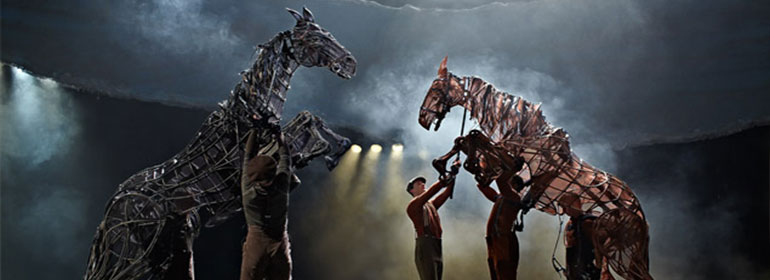War Horse may have its flaws, but they pale into insignificance under the power of its puppets, says Brian Finnegan.
It’s easy, with the epic marketing imagery for War Horse, and the general knowledge that it’s set during the battles of World War I, to forget that it began its life as a children’s book by Michael Morpurgo. But from the outset, the British National Theatre touring production of War Horse never lets you forget. A set that’s almost imaginary, supplemented with projected pencil illustrations, lends the show a kind of magical storytime effect, and from the moment we meet the equine star of the show, the foal Joey, and he begins to bond with the boy, Albert, we’re the comfortably childish territory of Black Beauty and its like.

Before we get down to why War Horse is globally the most successful non-musical show to ever come out of the West End, let’s get the story, such as it is, out of the way. The basics are simple: boy meets horse, boy loses horse, boy finds horse again. There’s a local villain, trying to stop the boy from getting what he wants (the horse) at the start, and some fatherly betrayal that sends the horse to the front, but the big baddie here is the Great War. In fact, it’s all war, because War Horse is ultimately about the futile mindlessness of war – the very inhumanity of this very human thing, shown to us through the eyes of a ‘lesser’ being.
And here’s where the puppets come in. Despite the very simplistic nature of the story we’re watching, the epic puppets created by the South African company, Handspring, are complex beasts in all sorts of ways. Their skeletal construction; the way they’re animated by three men who we see but don’t at the same time; the minutiae of their movements; the fact that they may as well be living, breathing creatures with blood pumping through veins – it all seems understandable but absolutely inexplicable at the same time.
But what’s equally inexplicable, and magical, is the emotional power these puppets wield. The real horses of Steven Spielberg’s film version could never have had such a visceral, gut-wrenching, tear-inducing effect. It’s the very fact that we’re watching puppets that makes War Horse so moving, and it’s hard to explain why. I’m tempted to say it’s the epic scale of the puppets themselves, but it’s not that. There’s a beating heart to these synthetic creations that speaks to the human heart.
Along the way there’s far too much singing of earnest folk songs for my liking, the hammiest German accents I’ve ever seen in a stage production, a very annoying little French girl, a stable of sentimental clichés, and a pretty unbelievable plot, but none of that matters an iota. The story of War Horse may be about the futility of war, reflected through the unconditional love of an animal, but what this show is really about is how theatre can reach into the imagination, simply through the power of suggestion, and touch the soul.
For more information and to book tickets visit Bord Gais Energy Theatre
© 2014 GCN (Gay Community News). All rights reserved.
